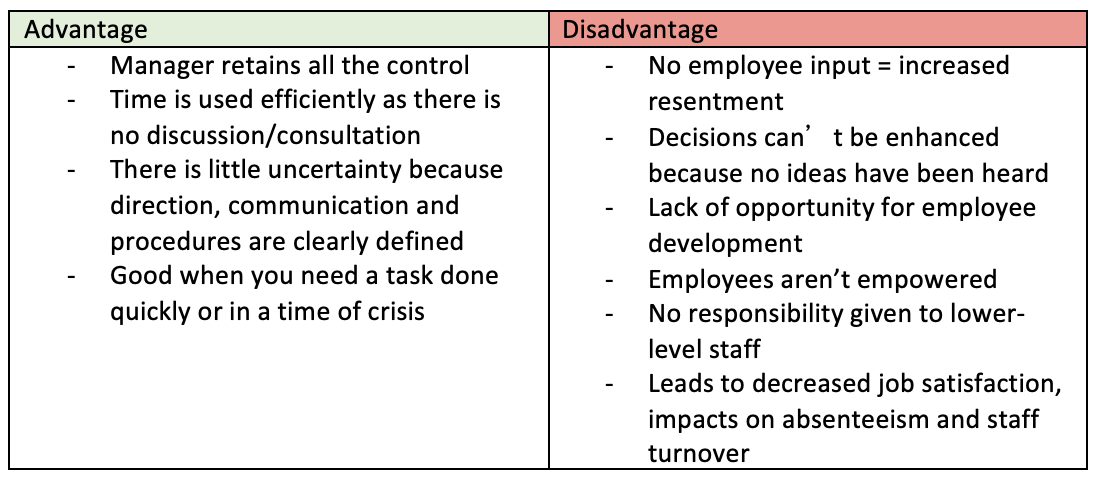KK5: Management Styles
1/10
There's no tags or description
Looks like no tags are added yet.
Name | Mastery | Learn | Test | Matching | Spaced |
|---|
No study sessions yet.
11 Terms
Management Style Definition
The behaviour and attitude of the manager when making decisions, directing, motivating staff, and implementing plans to achieve business objectives.
Autocratic Management Style
Autocratic refers to a management style characterised by direct control over employees with little to no input from employees and centralised decision making
Managers place a great importance on achieving tasks and following the established process
Policies and procedures are maintained in detail and enforced by frequent checks (i.e micromanagement)
There is a high regard for efficiency
Centralised decision making
Communication is downward
Worker participation in decision-making is minimal
advantages & disadvantages of autocratic

Persuasive Management Style
Characterised by centralised decision making with attempts to persuade workers of the benefits of decisions
Managers place great importance on achieving the task and following the established process
Policies are maintained in detail and enforced by frequent checks as there is a high regard for efficiency
Communication is centralised with a hierarchical chain of command approach
advantages & disadvantages of persuasive

Consultative Management Style
Consultative management is a management style characterized by
decision-making that involves managers seeking input and feedback
from employeesStill centralised decision making but based on the suggestions and
input received after consultation with employeesMore employee-based and less centralised than the autocratic and
persuasive styles (employees provide ideas and concepts)Managers believe task achievement is important, but places value on the
importance of employee contribution to overall performance of the
business.Two-way communication – communication that is open and
encourages feedback and discussion (i.e., both top down and bottom-up)
advantages & disadvantages of consultative

Participative Management Style
Participative Management is a management style characterized by
shared and collective decision-making with the manager retaining
accountability.Decentralised decision-making workers are given responsibility
(empowerment) for decision-making in their own areas.Decentralisation of power: power/authority is delegated from
higher levels to lower levels in the hierarchy.Objectives are still determined by senior management
Focus on people
Two-way communication
advantages & disadvantages of participative

Laissez-faire Management Style
Laissez-faire management is a management style characterized
by complete freedom being provided to employees to make
decisions (completely decentralized – manager has very little role)Employees empowered to solve their own problems and make
their own decisions.Commonly found where employees are highly educated, skilled
and experienced. This group of employees need little direction
and has their own motivation to accomplish tasks.Suitable for industries where creative freedom is important e.g.
advertising, product design, social media, specialised engineering/
architecture
advantages & disadvantages of laissez-faire
